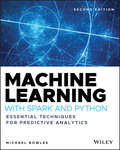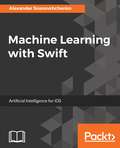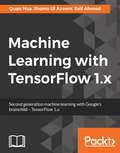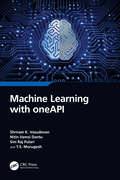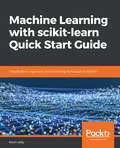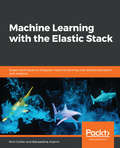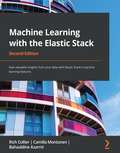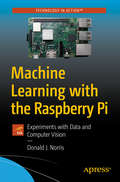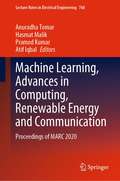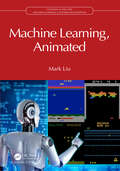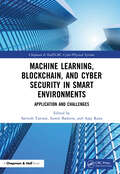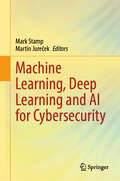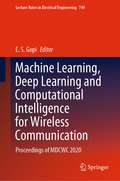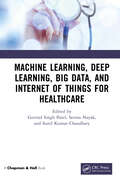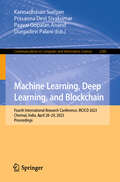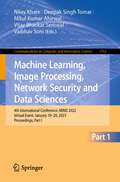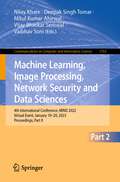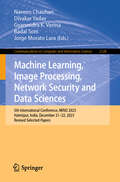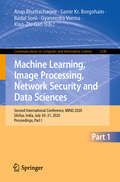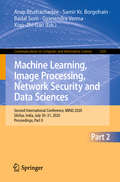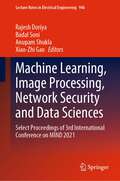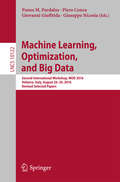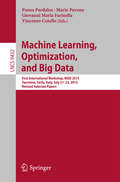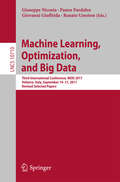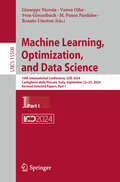- Table View
- List View
Machine Learning with Spark and Python: Essential Techniques for Predictive Analytics
by Michael BowlesMachine Learning with Spark and Python Essential Techniques for Predictive Analytics, Second Edition simplifies ML for practical uses by focusing on two key algorithms. This new second edition improves with the addition of Spark—a ML framework from the Apache foundation. By implementing Spark, machine learning students can easily process much large data sets and call the spark algorithms using ordinary Python code. Machine Learning with Spark and Python focuses on two algorithm families (linear methods and ensemble methods) that effectively predict outcomes. This type of problem covers many use cases such as what ad to place on a web page, predicting prices in securities markets, or detecting credit card fraud. The focus on two families gives enough room for full descriptions of the mechanisms at work in the algorithms. Then the code examples serve to illustrate the workings of the machinery with specific hackable code.
Machine Learning with Swift: Artificial Intelligence for iOS
by Oleksandr Sosnovshchenko Oleksandr BaievLeverage the power of machine learning and Swift programming to build intelligent iOS applications with ease Key Features Implement effective machine learning solutions for your iOS applications Use Swift and Core ML to build and deploy popular machine learning models Develop neural networks for natural language processing and computer vision Book Description Machine learning as a field promises to bring increased intelligence to the software by helping us learn and analyse information efficiently and discover certain patterns that humans cannot. This book will be your guide as you embark on an exciting journey in machine learning using the popular Swift language. We’ll start with machine learning basics in the first part of the book to develop a lasting intuition about fundamental machine learning concepts. We explore various supervised and unsupervised statistical learning techniques and how to implement them in Swift, while the third section walks you through deep learning techniques with the help of typical real-world cases. In the last section, we will dive into some hard core topics such as model compression, GPU acceleration and provide some recommendations to avoid common mistakes during machine learning application development. By the end of the book, you'll be able to develop intelligent applications written in Swift that can learn for themselves. What you will learn Learn rapid model prototyping with Python and Swift Deploy pre-trained models to iOS using Core ML Find hidden patterns in the data using unsupervised learning Get a deeper understanding of the clustering techniques Learn modern compact architectures of neural networks for iOS devices Train neural networks for image processing and natural language processingWho this book is for iOS developers who wish to create smarter iOS applications using the power of machine learning will find this book to be useful. This book will also benefit data science professionals who are interested in performing machine learning on mobile devices. Familiarity with Swift programming is all you need to get started with this book.
Machine Learning with TensorFlow 1.x
by Quan Hua Shams Ul Azeem Saif AhmedAbout This BookEnter the new era of second-generation machine learning with Python with this practical and insightful guideSet up TensorFlow 1.x for actual industrial use, including high-performance setup aspects such as multi-GPU supportCreate pipelines for training and using applying classifiers using raw real-world dataWho This Book Is ForThis book is for data scientists and researchers who are looking to either migrate from an existing machine learning library or jump into a machine learning platform headfirst. The book is also for software developers who wish to learn deep learning by example. Particular focus is placed on solving commercial deep learning problems from several industries using TensorFlow's unique features. No commercial domain knowledge is required, but familiarity with Python and matrix math is expected.What You Will LearnExplore how to use different machine learning models to ask different questions of your dataLearn how to build deep neural networks using TensorFlow 1.xCover key tasks such as clustering, sentiment analysis, and regression analysis using TensorFlow 1.xFind out how to write clean and elegant Python code that will optimize the strength of your algorithmsDiscover how to embed your machine learning model in a web application for increased accessibilityLearn how to use multiple GPUs for faster training using AWSIn DetailGoogle's TensorFlow is a game changer in the world of machine learning. It has made machine learning faster, simpler, and more accessible than ever before. This book will teach you how to easily get started with machine learning using the power of Python and TensorFlow 1.x.Firstly, you'll cover the basic installation procedure and explore the capabilities of TensorFlow 1.x. This is followed by training and running the first classifier, and coverage of the unique features of the library including data ?ow graphs, training, and the visualization of performance with TensorBoard—all within an example-rich context using problems from multiple industries. You'll be able to further explore text and image analysis, and be introduced to CNN models and their setup in TensorFlow 1.x. Next, you'll implement a complete real-life production system from training to serving a deep learning model. As you advance you'll learn about Amazon Web Services (AWS) and create a deep neural network to solve a video action recognition problem. Lastly, you'll convert the Caffe model to TensorFlow and be introduced to the high-level TensorFlow library, TensorFlow-Slim.By the end of this book, you will be geared up to take on any challenges of implementing TensorFlow 1.x in your machine learning environment.
Machine Learning with oneAPI
by Shriram K. Vasudevan Sini Raj Pulari T.S. Murugesh Nitin Vamsi DantuoneAPI is a unified programming model and software development kit (SDK) from Intel that empowers software developers to generate high-performance applications that can run on different devices, comprising CPUs, GPUs, FPGAs, and other accelerators. It lets developers write code once and deploy it on multiple architectures, decreasing the complexity as well as the cost and time of software development. One of the significant strengths of oneAPI is in its capability to support an eclectic range of devices and architectures, including artificial intelligence, high-performance computing, and data analytics. Along with libraries, tools, and compilers, oneAPI makes it cool for developers to create optimized code for an extensive variety of applications, making it an indispensable tool for any developer who wants to create high-performance software and reap the benefit of the latest hardware technologies. The versatility of oneAPI, by means of appropriate theory and practical implementation with the latest tools in machine learning, has been presented in a simple yet effective way in this book that caters to everyone’s needs. Come on, let’s unleash the true power of our code across varied architectures!
Machine Learning with scikit-learn Quick Start Guide: Classification, regression, and clustering techniques in Python
by Kevin JollyDeploy supervised and unsupervised machine learning algorithms using scikit-learn to perform classification, regression, and clustering.Key FeaturesBuild your first machine learning model using scikit-learnTrain supervised and unsupervised models using popular techniques such as classification, regression and clusteringUnderstand how scikit-learn can be applied to different types of machine learning problemsBook DescriptionScikit-learn is a robust machine learning library for the Python programming language. It provides a set of supervised and unsupervised learning algorithms. This book is the easiest way to learn how to deploy, optimize, and evaluate all of the important machine learning algorithms that scikit-learn provides.This book teaches you how to use scikit-learn for machine learning. You will start by setting up and configuring your machine learning environment with scikit-learn. To put scikit-learn to use, you will learn how to implement various supervised and unsupervised machine learning models. You will learn classification, regression, and clustering techniques to work with different types of datasets and train your models.Finally, you will learn about an effective pipeline to help you build a machine learning project from scratch. By the end of this book, you will be confident in building your own machine learning models for accurate predictions.What you will learnLearn how to work with all scikit-learn's machine learning algorithmsInstall and set up scikit-learn to build your first machine learning modelEmploy Unsupervised Machine Learning Algorithms to cluster unlabelled data into groupsPerform classification and regression machine learningUse an effective pipeline to build a machine learning project from scratchWho this book is forThis book is for aspiring machine learning developers who want to get started with scikit-learn. Intermediate knowledge of Python programming and some fundamental knowledge of linear algebra and probability will help.
Machine Learning with the Elastic Stack: Expert techniques to integrate machine learning with distributed search and analytics
by Bahaaldine Azarmi Rich CollierLeverage Elastic Stack's machine learning features to gain valuable insight from your data Key Features Combine machine learning with the analytic capabilities of Elastic Stack Analyze large volumes of search data and gain actionable insight from them Use external analytical tools with your Elastic Stack to improve its performance Book Description Machine Learning with the Elastic Stack is a comprehensive overview of the embedded commercial features of anomaly detection and forecasting. The book starts with installing and setting up Elastic Stack. You will perform time series analysis on varied kinds of data, such as log files, network flows, application metrics, and financial data. As you progress through the chapters, you will deploy machine learning within the Elastic Stack for logging, security, and metrics. In the concluding chapters, you will see how machine learning jobs can be automatically distributed and managed across the Elasticsearch cluster and made resilient to failure. By the end of this book, you will understand the performance aspects of incorporating machine learning within the Elastic ecosystem and create anomaly detection jobs and view results from Kibana directly. What you will learn Install the Elastic Stack to use machine learning features Understand how Elastic machine learning is used to detect a variety of anomaly types Apply effective anomaly detection to IT operations and security analytics Leverage the output of Elastic machine learning in custom views, dashboards, and proactive alerting Combine your created jobs to correlate anomalies of different layers of infrastructure Learn various tips and tricks to get the most out of Elastic machine learning Who this book is for If you are a data professional eager to gain insight on Elasticsearch data without having to rely on a machine learning specialist or custom development, Machine Learning with the Elastic Stack is for you. Those looking to integrate machine learning within their search and analytics applications will also find this book very useful. Prior experience with the Elastic Stack is needed to get the most out of this book.
Machine Learning with the Elastic Stack: Gain valuable insights from your data with Elastic Stack's machine learning features, 2nd Edition
by Bahaaldine Azarmi Rich Collier Camilla MontonenDiscover expert techniques for combining machine learning with the analytic capabilities of Elastic Stack and uncover actionable insights from your dataKey FeaturesIntegrate machine learning with distributed search and analyticsPreprocess and analyze large volumes of search data effortlesslyOperationalize machine learning in a scalable, production-worthy wayBook DescriptionElastic Stack, previously known as the ELK stack, is a log analysis solution that helps users ingest, process, and analyze search data effectively. With the addition of machine learning, a key commercial feature, the Elastic Stack makes this process even more efficient. This updated second edition of Machine Learning with the Elastic Stack provides a comprehensive overview of Elastic Stack's machine learning features for both time series data analysis as well as for classification, regression, and outlier detection. The book starts by explaining machine learning concepts in an intuitive way. You'll then perform time series analysis on different types of data, such as log files, network flows, application metrics, and financial data. As you progress through the chapters, you'll deploy machine learning within Elastic Stack for logging, security, and metrics. Finally, you'll discover how data frame analysis opens up a whole new set of use cases that machine learning can help you with. By the end of this Elastic Stack book, you'll have hands-on machine learning and Elastic Stack experience, along with the knowledge you need to incorporate machine learning in your distributed search and data analysis platform.What you will learnFind out how to enable the ML commercial feature in the Elastic StackUnderstand how Elastic machine learning is used to detect different types of anomalies and make predictionsApply effective anomaly detection to IT operations, security analytics, and other use casesUtilize the results of Elastic ML in custom views, dashboards, and proactive alertingTrain and deploy supervised machine learning models for real-time inferenceDiscover various tips and tricks to get the most out of Elastic machine learningWho this book is forIf you're a data professional looking to gain insights into Elasticsearch data without having to rely on a machine learning specialist or custom development, then this Elastic Stack machine learning book is for you. You'll also find this book useful if you want to integrate machine learning with your observability, security, and analytics applications. Working knowledge of the Elastic Stack is needed to get the most out of this book.
Machine Learning with the Raspberry Pi: Experiments with Data and Computer Vision
by Donald J. NorrisUsing the Pi Camera and a Raspberry Pi board, expand and replicate interesting machine learning (ML) experiments. This book provides a solid overview of ML and a myriad of underlying topics to further explore. Non-technical discussions temper complex technical explanations to make the hottest and most complex topic in the hobbyist world of computing understandable and approachable.Machine learning, also commonly referred to as deep learning (DL), is currently being integrated into a multitude of commercial products as well as widely being used in industrial, medical, and military applications. It is hard to find any modern human activity, which has not been "touched" by artificial intelligence (AI) applications. Building on the concepts first presented in Beginning Artificial Intelligence with the Raspberry Pi, you’ll go beyond simply understanding the concepts of AI into working with real machine learning experiments and applying practical deep learning concepts to experiments with the Pi board and computer vision. What you learn with Machine Learning with the Raspberry Pi can then be moved on to other platforms to go even further in the world of AI and ML to better your hobbyist or commercial projects.What You'll LearnAcquire a working knowledge of current ML Use the Raspberry Pi to implement ML techniques and algorithmsApply AI and ML tools and techniques to your own work projects and studiesWho This Book Is ForEngineers and scientists but also experienced makers and hobbyists. Motivated high school students who desire to learn about ML can benefit from this material with determination.
Machine Learning, Advances in Computing, Renewable Energy and Communication: Proceedings of MARC 2020 (Lecture Notes in Electrical Engineering #768)
by Pramod Kumar Atif Iqbal Hasmat Malik Anuradha TomarThis book gathers selected papers presented at International Conference on Machine Learning, Advances in Computing, Renewable Energy and Communication (MARC 2020), held in Krishna Engineering College, Ghaziabad, India, during December 17–18, 2020. This book discusses key concepts, challenges, and potential solutions in connection with established and emerging topics in advanced computing, renewable energy, and network communications.
Machine Learning, Animated (Chapman And Hall/crc Machine Learning And Pattern Recognition Ser.)
by Mark LiuThe release of ChatGPT has kicked off an arms race in Machine Learning (ML), however ML has also been described as a black box and very hard to understand. Machine Learning, Animated eases you into basic ML concepts and summarizes the learning process in three words: initialize, adjust and repeat. This is illustrated step by step with animation to show how machines learn: from initial parameter values to adjusting each step, to the final converged parameters and predictions. This book teaches readers to create their own neural networks with dense and convolutional layers, and use them to make binary and multi-category classifications. Readers will learn how to build deep learning game strategies and combine this with reinforcement learning, witnessing AI achieve super-human performance in Atari games such as Breakout, Space Invaders, Seaquest and Beam Rider. Written in a clear and concise style, illustrated with animations and images, this book is particularly appealing to readers with no background in computer science, mathematics or statistics. Access the book's repository at: https://github.com/markhliu/MLA
Machine Learning, Blockchain, and Cyber Security in Smart Environments: Application and Challenges (Chapman & Hall/CRC Cyber-Physical Systems)
by Ajay Rana Sarvesh Tanwar Sumit BadotraMachine Learning, Cyber Security, and Blockchain in Smart Environment: Application and Challenges provides far-reaching insights into the recent techniques forming the backbone of smart environments, and addresses the vulnerabilities that give rise to the challenges in real-word implementation. The book focuses on the benefits related to the emerging applications such as machine learning, blockchain and cyber security. Key Features: • Introduces the latest trends in the fields of machine learning, blockchain and cyber security • Discusses the fundamentals, challenges and architectural overviews with concepts • Explores recent advancements in machine learning, blockchain, and cyber security • Examines recent trends in emerging technologies This book is primarily aimed at graduates, researchers, and professionals working in the areas of machine learning, blockchain, and cyber security.
Machine Learning, Deep Learning and AI for Cybersecurity
by Mark Stamp Martin JurečekThis book addresses a variety of problems that arise at the interface between AI techniques and challenging problems in cybersecurity. The book covers many of the issues that arise when applying AI and deep learning algorithms to inherently difficult problems in the security domain, such as malware detection and analysis, intrusion detection, spam detection, and various other subfields of cybersecurity. The book places particular attention on data driven approaches, where minimal expert domain knowledge is required. This book bridges some of the gaps that exist between deep learning/AI research and practical problems in cybersecurity. The proposed topics cover a wide range of deep learning and AI techniques, including novel frameworks and development tools enabling the audience to innovate with these cutting-edge research advancements in various security-related use cases. The book is timely since it is not common to find clearly elucidated research that applies the latest developments in AI to problems in cybersecurity.
Machine Learning, Deep Learning and Computational Intelligence for Wireless Communication: Proceedings of MDCWC 2020 (Lecture Notes in Electrical Engineering #749)
by E. S. GopiThis book is a collection of best selected research papers presented at the Conference on Machine Learning, Deep Learning and Computational Intelligence for Wireless Communication (MDCWC 2020) held during October 22nd to 24th 2020, at the Department of Electronics and Communication Engineering, National Institute of Technology Tiruchirappalli, India. The presented papers are grouped under the following topics (a) Machine Learning, Deep learning and Computational intelligence algorithms (b)Wireless communication systems and (c) Mobile data applications and are included in the book. The topics include the latest research and results in the areas of network prediction, traffic classification, call detail record mining, mobile health care, mobile pattern recognition, natural language processing, automatic speech processing, mobility analysis, indoor localization, wireless sensor networks (WSN), energy minimization, routing, scheduling, resource allocation, multiple access, power control, malware detection, cyber security, flooding attacks detection, mobile apps sniffing, MIMO detection, signal detection in MIMO-OFDM, modulation recognition, channel estimation, MIMO nonlinear equalization, super-resolution channel and direction-of-arrival estimation. The book is a rich reference material for academia and industry.
Machine Learning, Deep Learning, Big Data, and Internet of Things for Healthcare
by Govind Singh Patel Sunil Kumar Chaudhary Seema NayakThis book reviews that narrate the development of current technologies under the theme of the emerging concept of healthcare, specifically in terms of what makes healthcare more efficient and effective with the help of high-precision algorithms. The mechanism that drives it is machine learning, deep learning, big data, and Internet of Things (IoT)—the scientific field that gives machines the ability to learn without being strictly programmed. It has emerged together with big data technologies and high-performance computing to create new opportunities to unravel, quantify, and understand data-intensive processes in healthcare operational environments. This book offers comprehensive coverage of the most essential topics, including: • Introduction to e-monitoring for healthcare • Case studies based on big data and healthcare • Intelligent learning analytics in healthcare sectors using machine learning and IoT • Identifying diseases and diagnosis using machine learning and IoT • Deep learning architecture and framework for healthcare using IoT • Knowledge discovery from big data of healthcare-related processing • Big data and IoT in healthcare • Role of IoT in sustainable healthcare • A heterogeneous IoT-based application for remote monitoring of physiological and environmental parameters
Machine Learning, Deep Learning, and Blockchain: Fourth International Research Conference, IRCICD 2023, Chennai, India, April 28–29, 2023, Proceedings (Communications in Computer and Information Science #2385)
by Prasanna Devi Sivakumar Kannadhasan Suriyan Paavai Gopalan Anand Durgadevi PalaniThis book constitutes the refereed proceedings of Fourth International Research Conference on Machine Learning, Deep Learning, and Blockchain, IRCICD 2023, held in Chennai, India, during April 28–29, 2023. The 9 full papers presented were carefully reviewed and selected from 147 submissions. They were organized in topical sections as follows: machine learning; deep learning; and block chain.
Machine Learning, Image Processing, Network Security and Data Sciences: 4th International Conference, MIND 2022, Virtual Event, January 19–20, 2023, Proceedings, Part I (Communications in Computer and Information Science #1762)
by Vijay Bhaskar Semwal Mitul Kumar Ahirwal Nilay Khare Deepak Singh Tomar Vaibhav SoniThis two-volume set (CCIS 1762-1763) constitutes the refereed proceedings of the 4th International Conference on Machine Learning, Image Processing, Network Security and Data Sciences, MIND 2022, held in Bhopal, India, in December 2022. The 64 papers presented in this two-volume set were thoroughly reviewed and selected from 399 submissions. The papers are organized according to the following topical sections: machine learning and computational intelligence; data sciences; image processing and computer vision; network and cyber security.
Machine Learning, Image Processing, Network Security and Data Sciences: 4th International Conference, MIND 2022, Virtual Event, January 19–20, 2023, Proceedings, Part II (Communications in Computer and Information Science #1763)
by Vijay Bhaskar Semwal Mitul Kumar Ahirwal Nilay Khare Deepak Singh Tomar Vaibhav SoniThis two-volume set (CCIS 1762-1763) constitutes the refereed proceedings of the 4th International Conference on Machine Learning, Image Processing, Network Security and Data Sciences, MIND 2022, held in Bhopal, India, in December 2022. The 64 papers presented in this two-volume set were thoroughly reviewed and selected from 399 submissions. The papers are organized according to the following topical sections: machine learning and computational intelligence; data sciences; image processing and computer vision; network and cyber security.
Machine Learning, Image Processing, Network Security and Data Sciences: 5th International Conference, MIND 2023, Hamirpur, India, December 21–22, 2023, Revised Selected Papers (Communications in Computer and Information Science #2128)
by Badal Soni Gyanendra K. Verma Naveen Chauhan Divakar Yadav Jorge Morato LaraThis book constitutes the refereed proceedings of the 5th International Conference on Machine Learning, Image Processing, Network Security and Data Sciences, MIND 2023, held in Hamirpur, India, during December 21–22, 2023. The 29 full papers included in this book were carefully reviewed and selected from 173 submissions. They were organized in topical sections as follows: Machine Learning; Image Processing; Network Security; and Data Sciences.
Machine Learning, Image Processing, Network Security and Data Sciences: Second International Conference, MIND 2020, Silchar, India, July 30 - 31, 2020, Proceedings, Part I (Communications in Computer and Information Science #1240)
by Xiao-Zhi Gao Arup Bhattacharjee Samir Kr. Borgohain Badal Soni Gyanendra VermaThis two-volume set (CCIS 1240-1241) constitutes the refereed proceedings of the Second International Conference on Machine Learning, Image Processing, Network Security and Data Sciences, MIND 2020, held in Silchar, India. Due to the COVID-19 pandemic the conference has been postponed to July 2020. The 79 full papers and 4 short papers were thoroughly reviewed and selected from 219 submissions. The papers are organized according to the following topical sections: data science and big data; image processing and computer vision; machine learning and computational intelligence; network and cyber security.
Machine Learning, Image Processing, Network Security and Data Sciences: Second International Conference, MIND 2020, Silchar, India, July 30 - 31, 2020, Proceedings, Part II (Communications in Computer and Information Science #1241)
by Xiao-Zhi Gao Arup Bhattacharjee Samir Kr. Borgohain Badal Soni Gyanendra VermaThis two-volume set (CCIS 1240-1241) constitutes the refereed proceedings of the Second International Conference on Machine Learning, Image Processing, Network Security and Data Sciences, MIND 2020, held in Silchar, India. Due to the COVID-19 pandemic the conference has been postponed to July 2020. The 79 full papers and 4 short papers were thoroughly reviewed and selected from 219 submissions. The papers are organized according to the following topical sections: data science and big data; image processing and computer vision; machine learning and computational intelligence; network and cyber security.
Machine Learning, Image Processing, Network Security and Data Sciences: Select Proceedings of 3rd International Conference on MIND 2021 (Lecture Notes in Electrical Engineering #946)
by Xiao-Zhi Gao Anupam Shukla Badal Soni Rajesh DoriyaThis book constitutes the refereed proceedings of the Third International Conference on Machine Learning, Image Processing, Network Security and Data Sciences, MIND 2021. The papers are organized according to the following topical sections: data science and big data; image processing and computer vision; machine learning and computational intelligence; network and cybersecurity. This book aims to develop an understanding of image processing, networks, and data modeling by using various machine learning algorithms for a wide range of real-world applications. In addition to providing basic principles of data processing, this book teaches standard models and algorithms for data and image analysis.
Machine Learning, Optimization, and Big Data
by Panos M. Pardalos Giuseppe Nicosia Piero Conca Giovanni GiuffridaThis book constitutes revised selected papers from the Second International Workshop on Machine Learning, Optimization, and Big Data, MOD 2016, held in Volterra, Italy, in August 2016. The 40 papers presented in this volume were carefully reviewed and selected from 97 submissions. These proceedings contain papers in the fields of Machine Learning, Computational Optimization and DataScience presenting a substantial array of ideas, technologies, algorithms, methods and applications.
Machine Learning, Optimization, and Big Data
by Panos Pardalos Vincenzo Cutello Mario Pavone Giovanni Maria FarinellaThis bookconstitutes revised selected papers from the First International Workshop onMachine Learning, Optimization, and Big Data, MOD 2015, held in Taormina, Sicily,Italy, in July 2015. The 32papers presented in this volume were carefully reviewed and selected from 73submissions. They deal with the algorithms, methods and theories relevant indata science, optimization and machine learning.
Machine Learning, Optimization, and Big Data: Third International Conference, MOD 2017, Volterra, Italy, September 14–17, 2017, Revised Selected Papers (Lecture Notes in Computer Science #10710)
by Panos Pardalos Giuseppe Nicosia Giovanni Giuffrida Renato UmetonThis book constitutes the post-conference proceedings of the Third International Workshop on Machine Learning, Optimization, and Big Data, MOD 2017, held in Volterra, Italy, in September 2017.The 50 full papers presented were carefully reviewed and selected from 126 submissions. The papers cover topics in the field of machine learning, artificial intelligence, computational optimization and data science presenting a substantial array of ideas, technologies, algorithms, methods and applications.
Machine Learning, Optimization, and Data Science: 10th International Conference, LOD 2024, Castiglione della Pescaia, Italy, September 22–25, 2024, Revised Selected Papers, Part I (Lecture Notes in Computer Science #15508)
by Giuseppe Nicosia Renato Umeton Varun Ojha Sven Giesselbach M. Panos PardalosThe three-volume set LNAI 15508-15510 constitutes the refereed proceedings of the 10th International Conference on Machine Learning, Optimization, and Data Science, LOD 2024, held in Castiglione della Pescaia, Italy, during September 22–25, 2024. This year, in the LOD Proceedings decided to also include the papers of the fourth edition of the Symposium on Artificial Intelligence and Neuroscience (ACAIN 2024). The 79 full papers included in this book were carefully reviewed and selected from 127 submissions. The LOD 2024 proceedings focus on machine learning, deep learning, AI, computational optimization, neuroscience and big data that includes invited talks, tutorial talks, special sessions, industrial tracks, demonstrations and oral and poster presentations of refereed papers.
